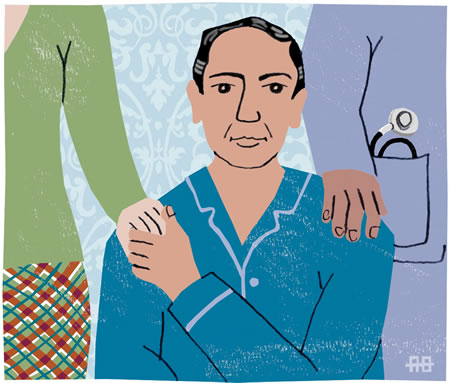By Kelly Brooks-Staub

When it comes to end-of-life care, most patients prefer to make health care decisions with input from their physician and family, rather than independently, according to a new study by associate professor Marie Nolan, DNSc, RN.
“For more than 20 years, physicians have assumed that patients should make health care decisions on their own—taking into account relevant medical facts, but without being influenced by the opinions of their family members and physician,” Nolan says. Her findings indicate, however, that “the model of autonomous decision-making may not account fully for the complexity of end-of-life care.”
Nolan’s study followed 130 patients who had been diagnosed with amyotrophic lateral sclerosis, advanced cancer, or congestive heart failure. Each had at least a 50 percent chance of dying within two years. Nolan and her team interviewed patients once every three months, and interviewed each family after the death of the patient.
The families came from a variety of cultural backgrounds: 64 percent were white, 23 percent black, and 12 percent Hispanic. Approximately 10 percent identified themselves as Jewish or having no religion. “We wanted to study the role of cultural and ethnic differences in health care decision making and the important roles that family and religious communities play in supporting patients at the end of life,” Nolan says. Her multidisciplinary research team also included Joan Kub, PhD, RN, of the School of Nursing; Mark Hughes, MD, and Peter Terry, MD, School of Medicine; Rick Thompson, PhD, School of Public Health; and School of Nursing student Kristen Johnson ’05.
The researchers found that if patients are able to speak for themselves, a majority (52%) would choose to make decisions together with their physicians, and many (44%) would choose to share decision making with their families. A significant minority (34%) would like to make their decision independently of their physician.
Perhaps surprisingly, some individuals would prefer that others make their medical decisions, even when they are conscious: 15 percent would give their physician that authority, while 6 percent would allow their loved ones to do so. Upon losing consciousness, 39 percent of patients would want their physician to make decisions for them, and 33 percent would prefer that their loved ones do so instead.
“Patients with terminal diagnoses report a wide diversity of decision control preferences,” says Nolan, “but most would opt to share decision-making with their physicians and loved ones. If unable to decide for themselves, they shift toward greater reliance on physician input relative to their own wishes, but would weigh loved ones’ input more heavily than physician input.”
Nolan was surprised to find that race, religion, gender, diagnosis, and health status were largely unassociated with patients’ decision making preferences.
Nolan’s results imply that patients should discuss with their families not only what they want if they are incapacitated, but how they want decisions to be made. Nurses, Nolan says, can help the family through this process since they tend to spend more time with patients and their families both before and after death.
“As nurses, we should really listen to the family and find out what is important to them. After the death of a patient, I will ask the family, ‘How did it go?’ And when I say to them ‘How wonderful that you could be there with them at the end,’ they respond ‘Yes, it was.’”
